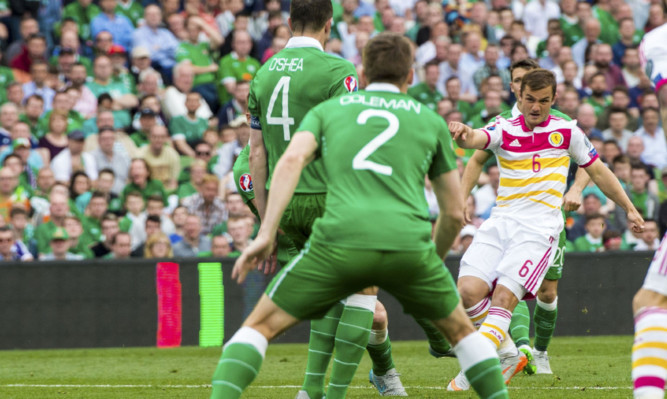
Scotland remain in the hunt to qualify for their first major championship Finals since 1998.
Whether the Tartan Army’s nerves will survive the journey is another matter.
Here, in an intense encounter at Dublin’s Aviva Stadium, they recovered from the loss of a first-half goal to an aggressive Republic side to grab a draw.
And if the point means the trip to Georgia in September will be best watched from behind the sofa, the final result wasn’t half bad.
With over 20,000 Scots in town, the big-match atmosphere had been building for days, aided by strategically placed giant billboards that cast Roy Keane as Mel Gibson’s Braveheart.
The retro feeling was extended as ‘Ally’s Tartan Army’ was belted out over the tannoy to the delight of the travelling fans.
And the announcement of the two line-ups, quite different to what had been expected, only added to the expectation.
Gordon Strachan has maintained an ability to surprise with his selections since taking control of the national side back at the start of 2013.
And here, with so much on the line, he did it again.
Craig Forsyth and Matt Ritchie, two players with a grand total of 45 minutes competitive international football experience between them, were both given starts.
Charlie Mulgrew, with only an hour of club football under his belt, likewise made the XI, covering for Grant Hanley at left centre-back.
Yet if the absence of Ikechi Anya and Andrew Robertson, two Strachan favourites, raised eyebrows, it was Martin O’Neill’s team that had a really unfamiliar look to it.
No Aiden McGeady, out with a hamstring, no Robbie Keane, who suffered a family bereavement in the week and has been troubled by injury, and no Shane Long, impressive in the English Premier League last season with Southampton.
The choices of Daryl Murphy and John Walters, two muscleman strikers, up front told its own story. Scotland were going to know they had been in a battle.
The thought might have been on Forsyth’s mind because the former Dundee defender got off to a bad start, making a rickets of an attempted clearance and allowing Murphy to dart in behind him.
The former Celtic striker failed to take full advantage and the full-back could breathe again.
The reprieve was only temporary.
Scotland were struggling to stem the tide of green down the left where Everton’s flying full-back Seamus Coleman was a persistent irritant.
And it was from there that the Irish got their breakthrough courtesy of their two combative frontmen.
Murphy did brilliantly to shed the attentions of first Mulgrew, then Steven Naismith to get on the end of a corner that had been whipped in by Robbie Brady.
His glancing header was kept out by the hand of David Marshall, but the keeper could only push the ball to Walters.
With his first touch he controlled it with his thigh and with his second he shot home.
Marshall appealed desperately for offside, the Stoke man having been the most advanced of the outfield players at the point of contact for Murphy.
Television evidence suggested he had a case, but referee Nicola Rizzoli wasn’t interested.
To be fair, an Ireland goal had been coming with their aggression giving them the edge in first half.
Glenn Whelan, Walters’ Stoke team-mate, had been fairly flying into his challenges and James McCarthy had players from both sides squaring up when he caught Russell Martin on the nose with his elbow.
Thrillingly, Scotland’s response to the loss of goal was equally defiant.
Off went the ineffective Ritchie at half-time and on came Anya.
The positive substitution delivered a near instant dividend with the Watford winger teeing up Shaun Maloney 20 yards out.
The Chicago Fire and former Celtic star had scored the country’s winner in the reverse fixture in Glasgow last November.
And here, on another huge stage, he hit the net again.
Looking up, he spotted Shay Given had left his far post exposed and curled a shot in its direction.
It was heading wide but found the net courtesy of a small deflection off John O’Shea’s back fair reward for the midfielder’s vision.
Managers, Strachan among them, are fond of saying that goals change games.
Here there was plenty of evidence to suggest they have a point.
As the thousands of Tartan Army secreted around the ground made their presence known, the Scotland players puffed their chests out.
The passes got quicker, the movement of the ball slicker as they pressed to find a winning advantage.
Anya was the catalyst and he remained the focus, with his team-mates using the winger as an outlet again and again.
Now, Coleman had a defensive worry to concern him.
The highly-rated defender didn’t enjoy facing Anya in Glasgow and it was a similar story here.
He was pushed back and nearly put through his own net when sliding in late to block one of Anya’s crosses, Given having to get up on his tiptoes to turn over.
O’Neill, seeing the initiative if not the game slip away, took a leaf out of Strachan’s book.
He turned to his substitutes bench, introducing first the talismanic Robbie Keane then Shane Long into the action.
It was worth a try but it didn’t work out.

Enjoy the convenience of having The Sunday Post delivered as a digital ePaper straight to your smartphone, tablet or computer.
Subscribe for only £5.49 a month and enjoy all the benefits of the printed paper as a digital replica.
Subscribe